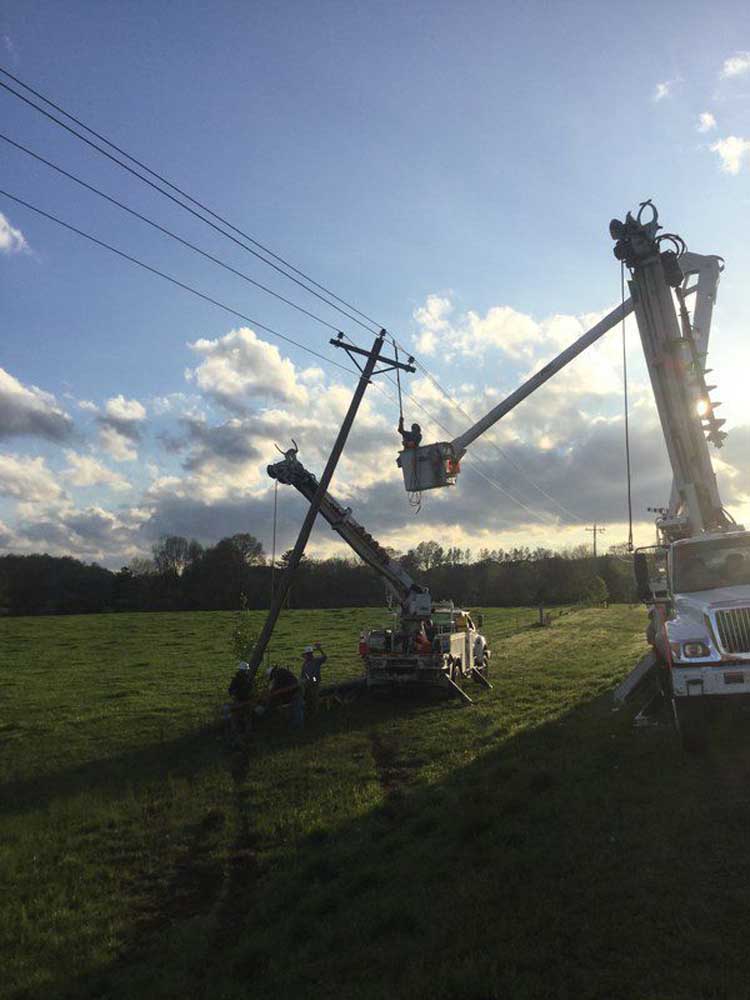Braving the storm and the aftermath
Published 12:07 am Sunday, September 24, 2017

- Contributed photoLinemen with North Georgia Electric Membership Corp. replace a pole struck by a car in April 2017.
They knew we were there to celebrate them — to recognize them — and the three men reluctantly filed into the small conference room at North Georgia Electric Membership Corp. to talk about their jobs as journeymen linemen.
They were a humble group, and noticeably uncomfortable with the accolades that heroes of the community receive. However, they fall into the same category as law enforcement officers, firemen, EMTs and military service men and women who put their lives in peril for the rest of us.
Trending
Alex Pimentel, Jay Satcher and Bradley Scott are among the 40 electrical line workers at North Georgia EMC, and they represent the 115,000 linemen of our country.
“Sure, it’s dangerous work,” Scott says, referring to hot wires–14,000 volts per line, by the way. “You have to be very aware of your surroundings and trust your co-workers. You have to have faith in your gloves, because the only thing between you and death is your gloves — and they’re only the thickness of a nickel.”
“But we’ve all been through extensive training,” Pimentel adds. “It’s a four-year apprentice program and covers everything from basic electricity to climbing poles to transformers to substations to troubleshooting to safety. Everything.”
The training program also requires that apprentice linemen attend seven days of formal training each year at the Georgia EMC training facility near Smarr in Middle Georgia, and the satisfactory completion of 10 tests each year. Even still, the work is extremely hazardous.
“My wife worries a lot about me,” Satcher said. “She really worries during storms.”
The three men describe a typical storm scenario. Everyone in the community rushes home to safety. Linemen leave the safety of home and rush to work.
Trending
“It’s not uncommon to work long hours –16 hours or more some times — during a storm,” Scott says. “You’re tired, fatigued and working in the dark around downed power lines.”
And there’s the added frustration that comes from impatient power consumers who want their power back on immediately.
“During outages, a lot of people don’t understand that there is a protocol involved in troubleshooting and repair work,” Scott adds. “No matter how angry or upset a customer is, we have to follow proper safety protocol, because at the end of the day, we do not want to jeopardize anyone’s life.”
“We can’t just ride out somewhere and reconnect a cable,” he adds. “We have to ride it out and make sure that it isn’t resting on the ground somewhere before we re-energize the line. We have to put our eyes on it because that’s the safe way to do it. It would be horrible if we simply reconnected a line and a child was down the road touching the line on the ground. Most people don’t think about that, but we do.”
“We’re used to customers following us and watching,” Satcher adds. “It’s all just part of the job.”
Simply doing their jobs is the standard disclaimer of everyday heroes and heroines.
And heroes don’t hesitate to help others. Linemen often leave their families to travel out of town to help restore power to other communities.
“When we need them, they come here and help us, and when they need us, we go there and help them,” Satcher says. “It’s neighbors helping neighbors.”
Just days after the remnants of Hurricane Irma tore through Florida and South Georgia, caravans of power utility vehicles rolled southward on I-75 to Florida from the far reaches of the United States to help rebuild networks and restore power to the millions affected by Irma’s wrath. Several North Georgia EMC linemen packed up and left to help fellow electric cooperatives — southeast to Amicalola EMC, northeast to Blue Ridge Mountain EMC and east to Habersham EMC.
“We went to South Carolina last year to help out after Hurricane Matthew,” Pimentel says. “We got there at midnight and got three or four hours of sleep before we had to get up and start working. We met in a big room with the other linemen, ate some breakfast, prayed and then we went to work.”
“There were 13,000 people without power where we were. We were on hooks for two days straight,” Scott says, referencing the hooks linemen use to climb poles. “If you’re on a pole for a long time, your feet get numb.”
Scott gave us a demonstration. He buckled on hooks and a tool belt that weighs about 30 pounds and climbed to the top of a training pole in less than a minute — not a job for the weak or people who are scared of heights. He explains that linemen are re-certified each year to ensure they can still do the tasks necessary for the job.
The three chuckle when asked about their least favorite part of their job.
“Most of the time, we set the poles by digging a deep hole with an auger,” Satcher says. “But sometimes, we can’t get the truck into a position to use an auger, so we have to dig that deep hole by hand. It can be horrible.”
The others nodded in agreement.
North Georgia EMC delivers power to about 99,500 metering points, through 6,400 miles of line, 34 substations and four area offices.
“We appreciate the tireless efforts of our line crews, especially during times of inclement weather such as Hurricane Irma,” said Jeff Brown, vice president of operations. “Linemen step up in any weather condition and bring light to the darkness. Our linemen are dedicated to providing power with purpose, every day, any time, keeping the power on.”
It’s common for linemen to spend more time at work than at home with their families. Most have forged close bonds with one another and refer to their co-workers as family members, and brothers.
“We are all prideful of our work,” Pimentel said. “It can be tough sometimes, but there’s nothing like being up in a bucket over a dark neighborhood full of homes with children who are scared to death of the dark, then you do your job and bam — the whole neighborhood lights up again. That’s one of the most satisfying feelings there is.”






